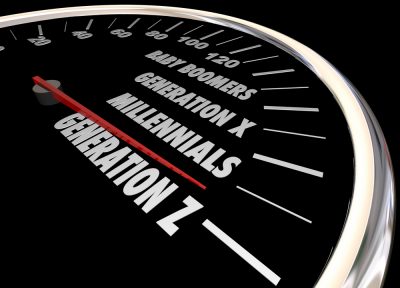3 MINUTE READ
Generations in the workplace? A hot topic currently across the globe.
If you are immersed in the management, leadership or recruitment field you will be aware of the rising impact of the different generations we all recruit.
This is especially important in the UK, that is gripped by the current skills shortage and a workforce where retirement at 65 is no longer the norm.
Why is this important?

In today's connected world, our multi-generational workforce is different to years gone by. The impact of a post war population boom, the swinging sixties, personal development, the internet followed by a worldwide recession, has made a difference to many of our values, beliefs and motivations; how could it not?
The question is, have you factored this into the workforce growth plans for your organisation? How will you motivate develop and retain across the workplace spectrum?
In this post, we want to refresh everyone’s knowledge on the different generations and then later in our series we will cover the motivation and talent attraction strategies to consider.
The three main generations we want to cover here are Baby Boomers, Gen X and Gen Y. Gen Z as a group, are still yet taking shape, so for now we won’t focus on their place in the work force.
Here at Lucy Walker Recruitment we talk to candidates across all generations daily and it still takes us by surprise the different wants and needs of each.
Though much of the work force moving forward will be the millennial generation, there are other important generations to consider.
The Pew Research Centre in the US mapped out some interesting data, which you can read here. Though the US population is different to the UK, there are many general patterns that emerge.
Baby Boomers

Baby Boomers were the first real generation that anyone categorised, way back in the early 70’s. They were easy to label as they originally described people born post the end of World War II. But the phrase is now used to label people born from the end of the War (1939-45) all the way up to the early 1960s.
This generation came in at the start of real change. Telephones and TV's for all, a man on the moon, holidays abroad and the opportunity to buy our own home. Interesting that Steve Jobs, Bill Gates and Oprah Winfrey, billionaires of our time, all fall into this category.
Depending on your own company culture, hopefully these folks are likely to be the hardworking stalwarts who might be retiring soon. The truth is pensionable age has changed and some Boomers haven’t quite got their financial house in order. It’s likely that they will continue to work well into their late 60’s, either through necessity or choice.
Gen X
These individuals were born between the early 60’s and 1980’s, currently making up a huge portion of the UK workforce. Originally labelled as, lazy, uncommitted and independent; time has changed them as it does with most of us.
After dealing with dramatic fluctuations in the economy and everything else that has happened on the planet, this generation is prepared for anything. The lazy image is no longer relevant. In fact, several studies conducted on workplace habits have made the case that Generation X are resourceful, independent and self-sufficient.
Contrary to what some Gen Y people think, this generation embraces technology and social media. The 35-54 age demographic on Facebook make up 31.1% of the user group. That is 56 Million, currently the highest of any age group.
This group are hard workers, steeped in work ethic and want their skills to be used.
Gen Y Millennials

Potentially the most impactful generation in the workplace moving forward. These will be our future leaders over the next few decades.
The Gen Y/ Millennial phrase was first developed by William Strauss and Neil Howe, the well-known American sociologists. Born between 1980-2000, Gen Y are naturally shaped by technology.
Gen Y candidates ‘values’ are different to the other groups we have mentioned:
- Result focused generation - they want to achieve and expect a high level of engagement from their employers. Be prepared to be challenged from the initial interview and interaction you have with them.
- Family first - they are motivated by an organisation that understands their need for a work life balance. They will put in the hours, provided you are flexible to their commitments.
Warning: This are the group that see opportunity all around them, and if it’s not in their current working environment they will leave.
They have been brought up by a generation who taught them that anything is possible. This point comes out strongly in our workplace report (if you would like a copy its available here ).
If you would also like to subscribe to our blog, which features in Feedspot's Top 100 Recruitment blogs, to receive up-to-date and relevant information, please click the link below.
Can we help? We have placed and filled over 100,000 temp and permanent assignments over the last 30 years so have a range of techniques, ideas and platforms which could help you. Why not call us on 0113 367 2880 to have a conversation with one of our team. Alternatively drop us an email here or check out our Testimonials and Case Studies.





.webp)
.png)



.jpg)








.png)






